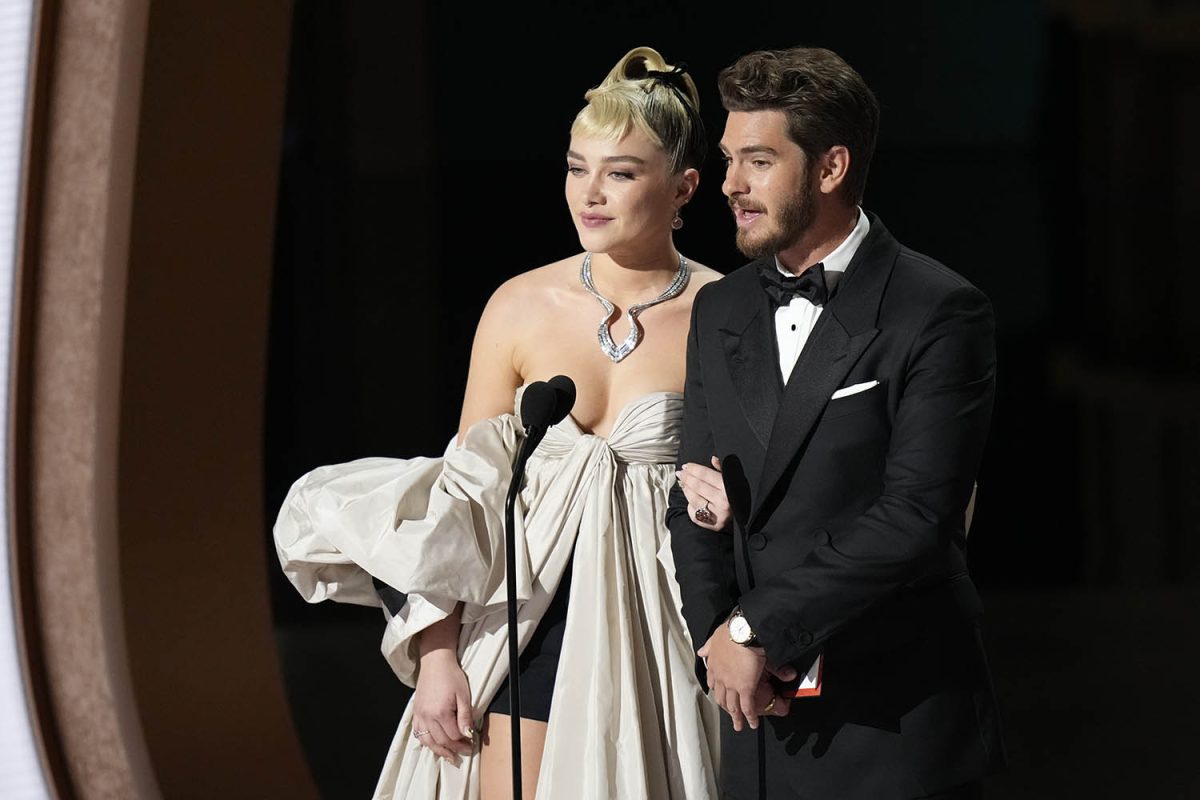Eggs metaphorically and literally define the major conflicts of A24’s newest weepy, emotional drama, “We Live in Time.”
The film opens with Almut, a professional chef depicted by Florence Pugh, cracking eggs in a kitchen using a three-bowl method, and quickly establishes a weaving, non-linear narrative. Over the next hour and 44 minutes, it captures the relationship between Tobias, played by Andrew Garfield, and Almut.
Through three intersecting stories: their early courtship, Almut’s pregnancy, and her battle with ovarian cancer, we get a whole picture of their lives together.
The non-linear structure is easy to follow and adds a dynamic layer to a story of everyday grief, love, and loss. The narrative slips between years, conflicts, and emotions as the film’s structure emphasizes the fleeting nature of experiences and the overarching theme of time —how it shapes us, how we use it, and how eventually, we lose it.
Almut’s cancer diagnosis is revealed early on, casting a shadow over the following scenes set in the earlier years of their relationship. After her diagnosis, Almut ponders forgoing treatment altogether, telling Tobias she would rather have six amazing months rather than 12 depressing ones.
This introduces the main conflict: What do we sacrifice when time is no longer plentifully guaranteed?
Alba is a modern woman — she buys her own condoms, isn’t fussed about marriage, and has no shortage of professional aspirations.
Her career takes center stage throughout the film, and her ambition and success in the male-dominated culinary industry are showcased heavily. In contrast, the professional life of Tobias is left almost entirely unexplored apart from a few needling jokes and a brief confirmation at the beginning of the movie that his job at Weetabix, a British cereal company, does in fact sometimes grant him free Weetabix.
Almut’s cancer diagnosis forces her to evaluate how to prioritize family, her career, and her declining health. While she ultimately undergoes treatment, she also seizes the opportunity to compete in the prestigious Bocuse d’Or culinary competition without telling Tobias, despite the event conflicting with their wedding and requiring physically strenuous preparation that could interfere with her treatment.
When Tobias finds out — because Almut gets so caught up in training that she forgets to pick up their daughter from school — they fight. In a heartbreaking scene, Almut, passionately states that she doesn’t just want to be someone’s dead mom.
She wants her daughter to remember her by her accomplishments, not just her declining health (a point that is slightly undermined by the fact that her declining health is depicted almost exclusively by a buzzcut worthy of a fashion editorial and the occasional vomiting spell).
RELATED: Review | Can romantic comedies really be ‘Nothing Like the Movies’?
The attempts made throughout the film to subvert gender stereotypes are inconsistent, which brings us to the second meaning of eggs in the film: children.
Tobias knows he wants children someday, and Almut asserts firmly that she doesn’t. This conflict is quickly resolved after Almut is given a choice between aggressively fighting her cancer, keeping her fertility, or undergoing a hysterectomy, lowering the risk of cancer returning.
She decides to retain her fertility, alluding to a desire to have a child with Tobias eventually.
Now don’t get it twisted. Women have the right to choose to prioritize their reproductive ability if they wish. However, the scene where Almut decisively rejects the idea of having children is plastered, virtually back-to-back with the scene where she decides to keep one of her ovaries in the hope of someday conceiving children.
This makes Almut’s decision to retain her fertility feel less like empowerment, and more like a male writer’s attempt to turn her into a tragic heroine, sacrificing her to an avoidable death for the sake of motherhood.
Pugh and Garfield both put on excellent performances, and the film is, as a whole, an emotionally compelling and absorbing watch. It seems to shy away from its own message about the complexity of illness, particularly for women with children, and instead attempts desperately to allow Almut to be everything: the perfect mother, a loving partner, and a professional success.



